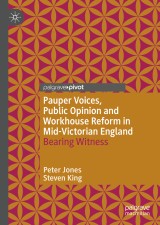Details

Pauper Voices, Public Opinion and Workhouse Reform in Mid-Victorian England
Bearing Witness|
58,84 € |
|
| Verlag: | Palgrave Macmillan |
| Format: | |
| Veröffentl.: | 08.08.2020 |
| ISBN/EAN: | 9783030478391 |
| Sprache: | englisch |
Dieses eBook enthält ein Wasserzeichen.
Beschreibungen
This book represents the first attempt to identify and describe a workhouse reform ‘movement’ in mid- to late-nineteenth-century England, beyond the obvious candidates of the Workhouse Visiting Society and the voices of popular critics such as Charles Dickens and Florence Nightingale. It is a subject on which the existing workhouse literature is largely silent, and this book therefore fills a considerable gap in our understanding of contemporary attitudes towards institutional welfare. Although many scholars have touched on the more obvious strands of workhouse criticism noted above, few have gone beyond these to explore the possibility that a concerted ‘movement’ existed that sought to place pressure on those with responsibility for workhouse administration, and to influence the trajectory of workhouse policy.
1. From Resistance to Reform: Changing Attitudes to the New Poor Law Workhouse in England and Wales.- 2. Not That Joseph Rowntree: An Amateur Workhouse Inspector.- 3. Pauper Letter Writers, Public Opinion, and the Workhouse Experience.- 4. Bearing Witness.
<b>Peter Jones</b> is a Research Associate at Nottingham Trent University, UK.<div><br></div><div><b>Steven King</b> is Professor of Economic and Social History at Nottingham Trent University, UK.</div>
This book represents the first attempt to identify and describe a workhouse reform ‘movement’ in mid- to late-nineteenth-century England, beyond the obvious candidates of the Workhouse Visiting Society and the voices of popular critics such as Charles Dickens and Florence Nightingale. It is a subject on which the existing workhouse literature is largely silent, and this book therefore fills a considerable gap in our understanding of contemporary attitudes towards institutional welfare. Although many scholars have touched on the more obvious strands of workhouse criticism noted above, few have gone beyond these to explore the possibility that a concerted ‘movement’ existed that sought to place pressure on those with responsibility for workhouse administration, and to influence the trajectory of workhouse policy.
Fills a considerable gap in our understanding of contemporary attitudes towards institutional welfare Explores the possibility that a concerted ‘movement’ existed that sought to place pressure on those with responsibility for workhouse administration Identifies a workhouse reform ‘movement’ beyond the obvious candidates of the Workhouse Visiting Society and the voices of popular critics such as Charles Dickens and Florence Nightingale
Diese Produkte könnten Sie auch interessieren:

The Last Samurai - Japanische Geschichtsdarstellung im populären Kinofilm

von: Daniel Scherrer

34,99 €















